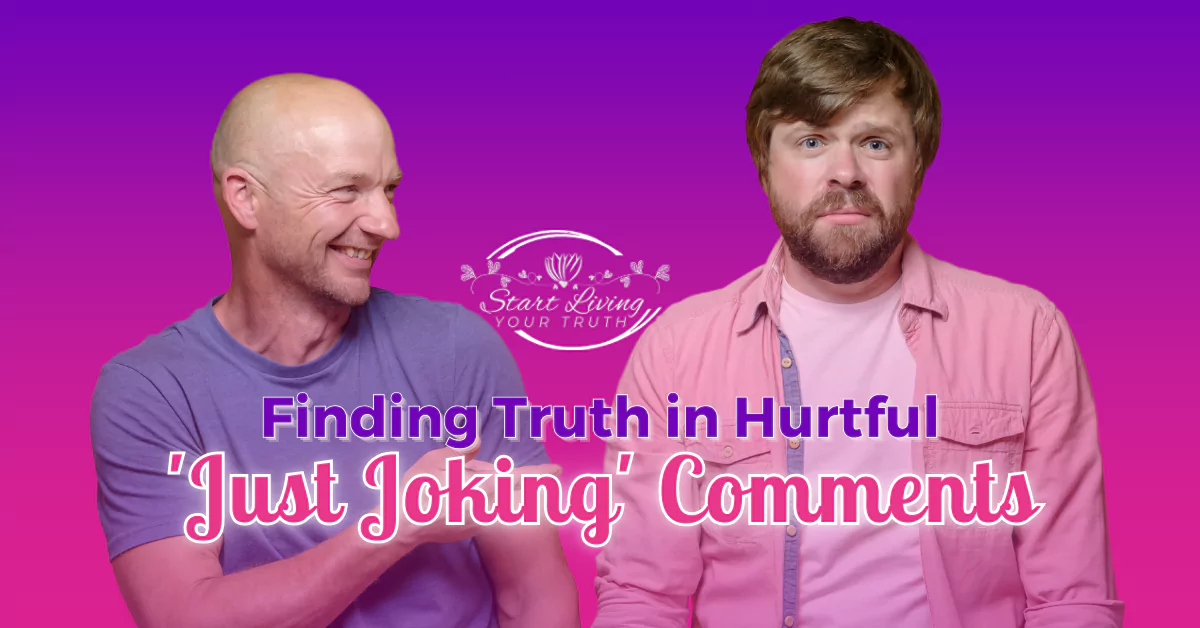
It happens in a split second.
Someone says something about you—maybe about how you look, how you act, or something deeply personal. It catches you off guard. It stings.
And just as you start to process it, they follow up with:
"Relax, I was just joking."
Suddenly, you're left feeling like you're the problem. Like you're being too sensitive. Like you should just laugh it off, even though your stomach is in knots.
But here's the truth: If it didn’t feel like a joke to you, it wasn’t a joke.

There’s a reason why some "jokes" don’t land the way they’re supposed to. A true joke makes everyone laugh—including you. But when a joke feels like a jab, it leaves you questioning yourself instead.
Maybe it plays on an insecurity you already have.
Maybe it highlights something you’ve tried to hide.
Maybe it makes you wonder, Is this what they really think of me?
That’s what makes these comments so damaging. They don’t just exist in the moment—they stick. You replay them, analyze them, and start to wonder if there’s truth in them.
🧠 Am I actually like that?
🧠 Does everyone see me this way?
🧠 Was that joke revealing what they really think about me?
It creates a loop of self-doubt, where you begin questioning things you never even worried about before.
💡 If this sounds familiar, The 100 Negative Thoughts Awareness List for Overthinkers can help you stop these spirals and break free from overanalyzing comments that were never yours to carry. Get it here.

People don’t always say hurtful things by accident. Sometimes, “just joking” is used as a shield—something they can hide behind so they never have to take responsibility.
Here’s why they do it:
🚩 To test boundaries. They want to see how much they can get away with before you push back.
🚩 To disguise their real thoughts. Instead of saying what they truly mean, they wrap it in a joke to see your reaction.
🚩 To control the narrative. If you call them out, they make you seem like the problem for "not being able to take a joke."
🚩 To make themselves feel bigger. Sometimes, people joke at others’ expense to distract from their own insecurities.
The hardest part? These jokes often come from people we trust—friends, family, partners, even colleagues. And when that happens, it makes you second-guess everything.
💡 If hurtful jokes have made you question your self-worth, Micro Self Worth Reset - 52 Emails to Reset Your Self Worth can help you rebuild trust in yourself—so someone else’s words don’t define how you see yourself. Join here.

At first, you might brush it off. You tell yourself it's not a big deal.
But when it keeps happening, something shifts.
You start watching what you say. You shrink yourself down to avoid being the next target. You start filtering your personality, your interests, even your sense of humor—because suddenly, nothing feels safe.
It’s like carrying a backpack of invisible weight. Every time someone makes a “harmless” joke at your expense, another rock gets added.
🎒 One comment about your intelligence.
🎒 Another joke about your appearance.
🎒 A sarcastic remark about your personality.
At first, you can handle it. But over time? The weight becomes impossible to ignore.
And the worst part? You start carrying that voice with you—long after they’ve stopped talking.
💭 What if they’re right?
💭 What if everyone sees me this way?
💭 What if I am the problem?
If you’ve ever felt this way, you are not alone. And you don’t have to keep carrying words that were never yours to begin with.
💡 The Name What You Feel - 1 Hour Emotional Awareness Workbook can help you process what you’re experiencing, giving you the words to name your emotions so you can let go of what isn’t yours. Get it here.

So what do you do when someone hides behind “just joking”?
✔ Trust Your Feelings. If a joke hurts, that’s valid. You don’t need permission to feel what you feel.
✔ Set Boundaries. Saying, "That’s not funny to me," is enough. You don’t owe them a debate.
✔ Detach from Their Intent. Whether they meant to hurt you or not doesn’t change how it made you feel.
✔ Reclaim Your Confidence. If their words have stuck with you, it’s time to rewrite the narrative.
📌 If overthinking hurtful comments keeps you stuck, The 100 Negative Thoughts Awareness List for Overthinkers can help.
📌 If these jokes have chipped away at your confidence, Micro Self Worth Reset - 52 Emails to Reset Your Self Worth will help you rebuild it.
📌 If you need help making sense of your emotions, The Name What You Feel - 1 Hour Emotional Awareness Workbook is here for you.
✨ You don’t have to accept “just joking” as an excuse for hurtful words. You deserve to be spoken to with respect—always.